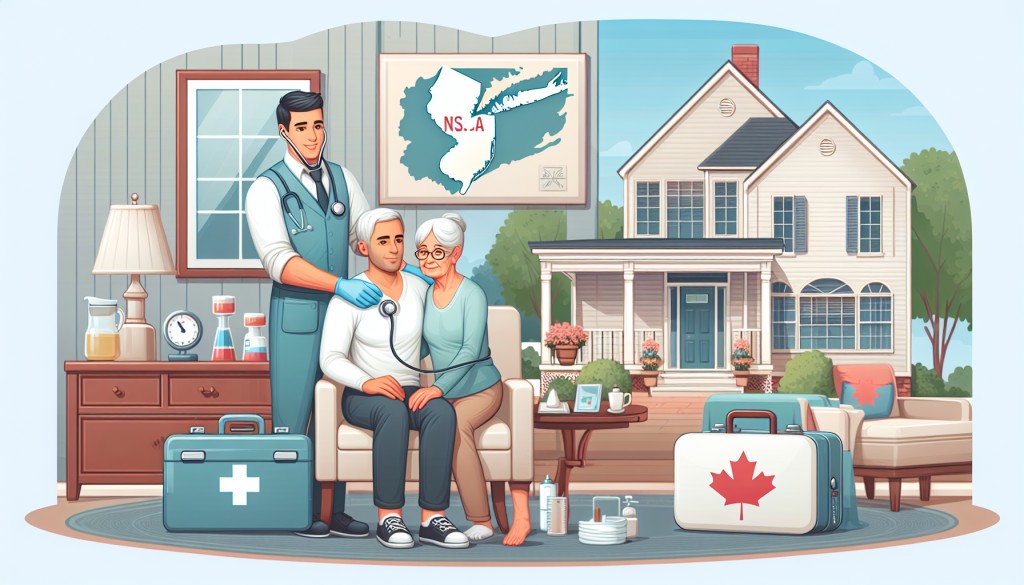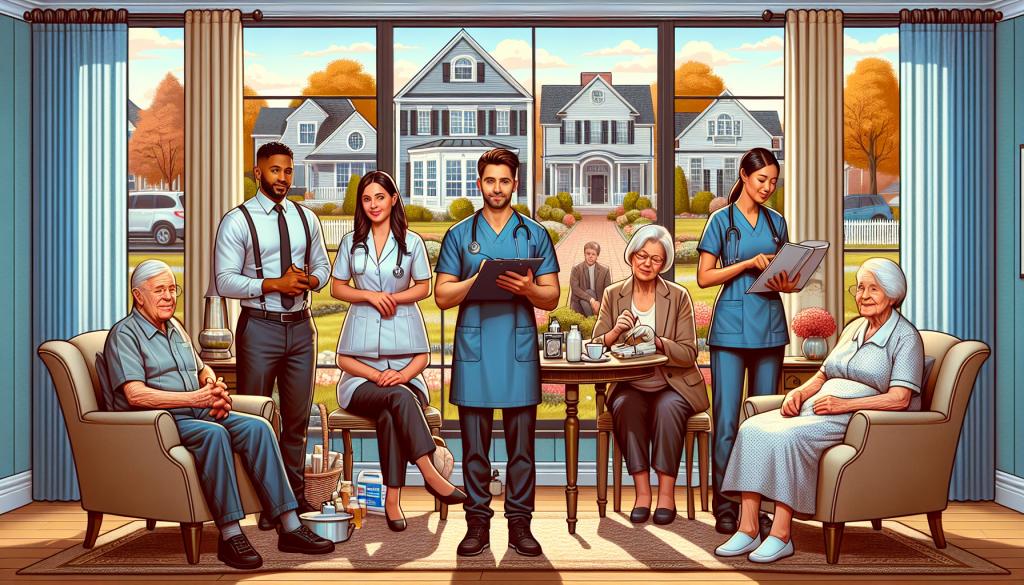Validate Licensing, Certification, and Quality Ratings
Before you authorize with any kind of home doctor in 2025, deal with licensing, accreditation, and high quality ratings as non‑negotiables. 2025 Home Care Wage Hikes: What Families Should Expect . Beginning with the basics: validate the firm is properly licensed in your state for the exact services you need. "Home wellness" (competent nursing, treatment, injury care) is controlled differently from "home treatment" or "personal care" (showering, clothing, friendship). Use your state health and wellness department or expert licensing board's online database to confirm the firm certificate is energetic and in excellent standing, and that it covers the best service classification. If the agency will certainly bill Medicare, verify it is Medicare‑certified; you can cross‑check this on Medicare's Care Contrast site.
Accreditation isn't the like a certificate, yet it signifies the company has actually fulfilled higher criteria and undertakes normal outside testimonial. Seek appreciated recognizing bodies such as The Joint Commission, CHAP, or ACHC. Request an existing certification certificate and the day of the last study. For non‑medical home care, certification is voluntary; if a company isn't approved, they must be able to discuss just how they preserve high quality and oversight in its absence.
Do a deeper credential examine the people who will certainly remain in your home. Nurse practitioner, accredited nurses, physical and physical therapists, and social workers all have private licenses you can verify with state boards. Home wellness aides ought to meet state training requirements. It's reasonable to ask the agency to confirm that all personnel have passed background checks, are out the federal OIG Exemptions Detail, and bring proper specialist obligation and workers' settlement insurance coverage. Request proof of the company's basic responsibility insurance; numerous households additionally request a certificate of insurance policy upon having.
Usage objective high quality ratings to contrast agencies, not just testimonials. On Medicare Treatment Contrast, examine the celebrity ratings and go into specific procedures like timely initiation of care, rehospitalization rates, improvement in flexibility and self‑care, and client experience ratings from HHCAHPS surveys. In 2025, Home Wellness Value‑Based Getting uses nationwide, so ask the company to share its most current efficiency or end result records and what it is doing to improve. For Medicaid home- and community‑based services, inspect your state's service provider directory site for top quality indications, vital event records, and EVV (digital browse through verification) conformity data. On the internet evaluations can be useful yet need to not bypass formal top quality information and regulative documents.
Request transparency. Ask the agency for its most recent state study outcomes and strategy of modification, any type of CMS sanctions or charges, and how issues are managed. In an age of telehealth and remote monitoring, inquire about gadget safety and personal privacy techniques, HIPAA compliance, and whether any type of electronic devices they make use of are FDA‑cleared where suitable. If the company asserts hospital or physician collaborations, confirm exactly how they share information, specifically if they incorporate with your medical professional's document system.
Red flags consist of incredibly elusive answers regarding licensing or study history, ended certification, missing proof of insurance coverage, unusually high personnel turn over without description, or quality scores well listed below local standards. A respectable service provider will welcome these inquiries, supply documentation quickly, and help you interpret rankings in the context of your needs. Validating credentials and high quality in advance takes some time, but it is one of the most trusted method to safeguard risk-free, efficient treatment at home.

Assess Telehealth, Remote Monitoring, and Data Protection
Evaluate Telehealth, Remote Monitoring, and Data Safety and security
In 2025, picking a home doctor implies looking past bedside skills to the digital foundation that supports your treatment. Telehealth, remote person tracking, and information security currently determine how hassle-free, safe, and linked your care will be.
Begin with telehealth. Video clip sees must really feel as trustworthy as an office appointment. Ask just how easy it is to routine, whether you can see the same medical professional for connection, and what takes place if the link goes down. Seek functions like e-prescribing, safe and secure messaging, after-visit summaries, and language access such as interpreters or inscriptions. Validate the system works on your devices, supports access demands, and provides technology aid for seniors or caretakers. Just as essential is assimilation: does the telehealth system talk with your existing medical documents so your health care medical professional sees updates? If treatment crosses state lines, validate licensure and whether your insurance provider covers the services you prepare to use.
Remote monitoring can change daily life for people taking care of persistent conditions, recovering after surgery, or needing security checks. Focus on medical worth and operational dependability. Which conditions do they keep track of and with what tools? Are the devices FDA-cleared and verified for home usage? Who enjoys the data, exactly how frequently, and what are the feedback times for unusual readings in the evening or on weekends? Ask just how sharp limits are readied to limit duds and exactly how frequently those thresholds are examined. Examine whether devices are lent or purchased, that takes care of arrangement, training, and substitute, and what cellular or Wi‑Fi connectivity is called for. Interoperability still matters here also: will your data flow right into your wellness document, and can you see it in a person application?

Information safety and security must never ever be an afterthought. A carrier's claim of "HIPAA certified" is a standard, not a differentiator. Seek independent audits or certifications (for example, SOC 2 Type II, HITRUST, or ISO 27001), file encryption of data en route and at rest, multi-factor authentication, and role-based accessibility with audit logs. Ask about occurrence feedback and violation notification procedures, exactly how typically they run security drills, and their technique to ransomware resilience and back-ups. For home devices, confirm that data is secured on the gadget and throughout transmission, software application is maintained to day, and shed or taken devices can be remotely wiped. Clarify that has your data, the length of time it's maintained, just how to request removal, and whether de-identified information is used for analytics or shown third parties. Ensure a Business Associate Agreement exists between the innovation suppliers and the care provider, which frontline team are learnt privacy methods, consisting of obtaining authorization for any type of recording.
Finally, take a look at the human side of the technology. Will they assist set up your Wi‑Fi or provide mobile kits if you do not have broadband? Do they offer clear instructions, large-print materials, multilingual support, and caretaker training? Exists 24/7 tech assistance and an easy method to escalate professional problems?
In an industry crowded with applications and devices, the very best home healthcare solutions in 2025 mix top notch professional treatment with dependable digital accessibility, workable tracking, and strenuous protection of your info. Select the team that explains their innovation clearly, shows their safeguards, and makes it easy for you and your family members to utilize.
Evaluate Treatment Program, Staffing, and Caretaker Fit
Picking home health care in 2025 methods looking beyond a glossy pamphlet. The best partner will certainly show you a clear care plan, trusted staffing, and a caregiver that really fits your liked one's requirements and individuality. Begin with the care strategy. Ask exactly how the agency assesses demands and collections objectives: not just identifies, but useful abilities, medicines, drop danger, cognitive support, nutrition, loneliness, transportation, and caretaker reprieve. A strong strategy is created by or under the supervision of a registered nurse or specialist, with measurable results (for example, less falls, enhanced mobility, medication adherence) and a schedule for testimonial-- typically every 30 to 60 days or after any type of change in problem. In 2025, several firms make use of remote individual surveillance and telehealth; make sure the strategy clarifies what gadgets are made use of, who assesses the information, and how details is shown your physician. Interoperability and privacy matter-- ask whether their systems link to your physician's electronic documents, just how data is safeguarded, and that can see updates.

Staffing is where guarantees meet reality. Make clear whether caretakers are W‑2 workers or 1099 contractors; workers commonly have more powerful oversight, training, and insurance policy coverage. Validate qualifications (CNA, HHA, LVN/LPN, RN), background checks, driving records if transportation is consisted of, immunizations, CPR, and any type of specialty training like dementia or Parkinson's treatment. Request for their turnover rate, average caregiver tenure, and fill rate for changes-- numbers that disclose stability. Connection is essential: will you have a primary caretaker with a small back-up swimming pool, or see regular turnings? What is the back-up prepare for sick days, no-shows, storms, or public wellness informs? In a tight labor market, agencies that pay fairly and use advantages have a tendency to preserve staff better-- don't hesitate to ask how they sustain caretaker well‑being and prevent exhaustion.
Caretaker fit exceeds availability. Share honest information about regimens, language choices, social or religious methods, animal comfort, smoking cigarettes level of sensitivities, music or food choices, and individuality design. An excellent firm will certainly make use of organized matching-- abilities, language, cultural competency, sex choice, driving ability, and physical ability for transfers or equipment-- to suggest a caregiver and established a meet‑and‑greet. Numerous will let you try a short trial shift prior to committing. Observe chemistry: Does the caretaker pay attention, make eye call, and ask thoughtful inquiries? Do they respect borders while being positive? If your liked one has mental deterioration, seek perseverance, redirection skills, and a calm, reassuring visibility.
Communication ought to be basic and regular. Ask to see the family members website or application if one exists: Can you view check out notes, jobs finished, vitals, and messages? Exactly how swiftly does the office respond, and what is the escalation course after hours? That is your named care supervisor, and just how usually will they visit in person to manage care? In 2025, lots of states require digital browse through confirmation-- confirm that clock‑in/ out safeguards you from invoicing for missed time, which your data is not used for anything else without approval.
Quality and liability are nonnegotiable. Search for accreditation (Joint Compensation, MAN, or ACHC) and state licensure. Ask about customer contentment scores, issue resolution time, occurrence rates (falls, hospital stays), and any value‑based programs they take part in. Request 2 recent client recommendations with comparable demands. Review agreement information meticulously: minimum hours, termination terms, substitute assurances, and what occurs if the caregiver isn't a fit. If you're using Medicare for proficient home health, clarify what is covered and for how much time; for personal task care, inquire about long‑term care insurance, Medicaid waivers, VA benefits, and whether the agency can aid with paperwork.
Practical safety and security inquiries round out the picture. Exactly how do they evaluate the home for hazards and suggest devices? Do they educate caretakers on risk-free transfers and infection control? What is the plan on cams in the home? If the caregiver will certainly drive your enjoyed one, verify insurance policy protection and lorry standards.
Red flags consist of unclear or cookie‑cutter care strategies, no registered nurse oversight, high turnover, frequent last‑minute timetable changes, hesitation to share result data, aggressive sales techniques, or resistance to a meet‑and‑greet. Green lights include transparent coverage, foreseeable staffing with back-ups, considerate matching, and a clear plan for continuous enhancement.
In the end, the right selection really feels both professional and personal. You should see a plan you can recognize, a group you can reach, and a caregiver your loved one anticipates seeing. If any piece doesn't feel right, keep looking-- fit, in home care, is every little thing.
Compare Pricing, Insurance Policy Protection, and Agreement Terms
Comparing rates, insurance coverage, and contract terms is where most families either conserve thousands-- or run into unpleasant surprises-- when choosing home healthcare solutions in 2025. Treat this like you would any significant purchase: need clarity, verify benefits in writing, and review the small print with a calm, unconvinced eye.
Start with rates. Ask each supplier for an itemized quote that matches your actual care plan: variety of hours weekly, degree of caretaker (aide vs. LPN/RN), and any type of specialized demands such as dementia care, injury treatment, or post-surgical assistance. In 2025 you'll see numerous models-- hourly prices, visit-based fees, live-in rates, and packed "crossbreed" plans integrating in-person care with telehealth and remote tracking. Contrast apples to apples by consisting of add-ons: minimum-hour needs, overtime thresholds, weekend and vacation costs, traveling or car park charges, nurse supervision or care management fees, modern technology or gadget leasing, and fees for urgent organizing. Ask how usually prices can change, whether there's a price-lock period, and if increases are tied to a fixed percentage or an index. Clarify what happens when the care plan adjustments mid-month: do they pro-rate or re-quote? If you're thinking about a computer system registry instead of a full-service firm, factor in your obligation for payroll taxes, workers' compensation, and liability-- what looks more affordable upfront can set you back much more in danger and management.
Next, pin down insurance policy coverage. Know the distinction in between medical home health (experienced nursing, treatment, commonly covered if clinically necessary) and non-medical home care (aid with showering, dishes, and companionship, typically not covered by conventional health insurance). For Medicare: proficient home health can be covered when eligibility criteria are met, however individual care is typically not, unless folded right into a strategy of care. Medicare Advantage plans increasingly provide supplemental in-home assistance, meal delivery, or remote surveillance-- benefits differ widely by strategy, require in-network providers, and might need prior consent or recertification, so verify restrictions, copays, and visit caps prior to you begin. Medicaid benefits and Home- and Community-Based Providers waivers can be charitable but differ by state and took care of care plan; waitlists and carrier networks issue. Lasting care insurance policy can fund significant hours once benefit triggers are satisfied (normally requiring help with two or even more activities of daily living or cognitive problems), but view elimination durations, day-to-day or regular monthly caps, and life time maximums. Experts may receive Aid and Participation or Homemaker/Home Wellness Aide solutions through the VA. Ask if the company will confirm benefits, manage authorizations, and expense straight, and whether they'll continue care if permissions gap. If you plan to self-pay, inquire about discount rates for longer schedules, autopay, or bundled programs. HSAs and FSAs can often be utilized for medically needed solutions; for tax obligation deductions or debts, speak with a tax obligation specialist.
Now, the contract terms-- the part lots of people skim and later on regret. Look for:
- Termination and notice: Can you pause or terminate without penalties? Are there minimums or early termination charges?
- Auto-renewal and rate adjustments: Just how are boosts interacted and capped?
- Staffing and alternatives: How swiftly do they replace a caretaker that's unwell or otherwise a fit? Exists a trial duration or complete satisfaction warranty?
- Non-solicitation and buy-out: If you intend to work with a caregiver directly later, what charge applies?
- Worker condition and insurance coverage: Are caregivers W-2 staff members covered by employees' compensation and obligation insurance coverage? Request proof.
- Scope of method: What tasks can aides legitimately carry out in your state (medication administration, transfers, catheter care)? Who supervises and exactly how usually?
- Documentation and transparency: Will you have access to electronic browse through logs, care notes, and reviews? That updates the treatment strategy and how often?
- Billing cycle and conflicts: Down payments, late fees, refunds for extra hours, rounding policies for change start/stop times, and the process for disputing a bill.
- Safety and privacy: Event reporting, infection control, background checks, driving policies, and information privacy for any kind of remote monitoring gadgets.
- Conflict resolution: Arbitration conditions, location, and your rights under state customer regulations.
Do a simple "true cost" comparison throughout finalists: projected weekly hours x rate + all anticipated charges-- confirmed insurance policy compensation. After that layer in non-financial value: responsiveness, back-up insurance coverage, supervisory quality, and result tracking. In 2025, trusted agencies can show high quality metrics and may participate in value-based programs-- request their a hospital stay decrease prices or customer contentment ratings.
Prior to signing, obtain every promise in composing, consisting of start day, caretaker certifications, and the specific solutions covered. If the contract feels thick or one-sided, have actually a trusted consultant or attorney assess it. The most effective bargain is not just the lowest rate-- it's the setup that provides safe, trustworthy treatment with foreseeable expenses and not a surprises.
